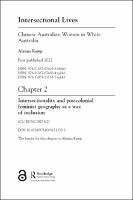Chapter 2 Intersectionality and postcolonial feminist geography as a way of inclusion
Proposal review
Abstract
In this chapter I detail my postcolonial feminist approach, with particular reference to recent moves in the discipline of geography (namely historical geography) to decolonialise the discipline and privilege women’s voices and experiences. I reflect on the use of colonialist tools for postcolonial purposes, my own positionality, and ways in which a focus on links between private and public spaces allows us to reconfigure female geographies. In doing so, I present historical geography and its postcolonial and feminist developments as an effective means of revising existing Chinese Australian historical research, understanding the complexity of female Chinese Australian lives in White Australia, and utilising such understandings to facilitate a clearer understanding of the contemporary Australian context. The book’s central theoretical and methodological position is also established, setting up the framework for the empirical analyses that follow. Within this discussion I posit intersectionality as a way to understand the diverse experiences and politics of belonging of Chinese Australian females in White Australia. I argue that intersectional analyses of women’s experiences are crucial to redressing androcentric and ethnocentric research approaches that have dominated Western research traditions and are pivotal in ensuring that ‘monolithic’ representations of ‘oppressed’ and ‘victimised’ Confucian woman are not perpetuated.


 Download
Download